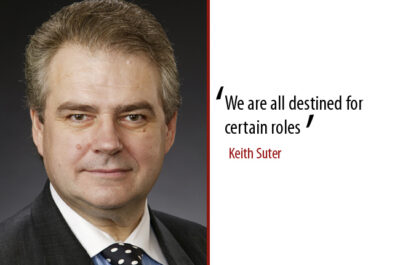Bring back the BIFF: Michael Block speaks about his world of fiduciary investments
Michael Block and entourage at a function in PNG
After running the investments for some big Australian funds – a university endowment, a government insurance fund and the funds management arm of two super funds – Michael Block has taken on a different challenge as CIO of Papua New Guinea’s main pension fund. He speaks to Greg Bright about his new job, which he started in July, and his unchanging fundamental investment beliefs.
The Nambawan Super Fund, which has about A$3 billion in assets, holds an important place in Papua New Guinea’s economy. It is the country’s biggest investor, for starters, and it attracts a lot of attention from politicians and the public alike, as you’d imagine. But for Michael Block, its well-known Australian CIO, liquidity is now his biggest issue.
Speaking in Sydney during a recent visit to watch his beloved Roosters rugby league team win the grand final, Block says that it is not so much the business rules which constrain the fund from making big asset allocation shifts, it’s more the importance of its holdings in local businesses and property.
“There are also a lot of little problems working in Port Moresby that you don’t think about in Australia,” he says. “For instance, telecommunications are not great. The internet is very slow. Data is hard to come by. And, because of the small population, its is difficult to find directors without other interests which may give rise to potential conflicts.”
Block, a popular speaker on the investment conference circuit, is no stranger to having politicians represented on his governing trustee board. His last two positions in Australia were Workcover NSW, the state government workers’ compensation fund, and FuturePlus, then part owned by two super funds – Local Government Super and Energy Industry Super Scheme – running the investments for the state’s councils and energy commission workers. Notwithstanding his experience with governments, he is notably outspoken. He once introduced himself at the podium of a fiduciary conference at Manly in Sydney: “I usually get invited to speak at conferences like this twice. The second time is to apologise for the first time.”
Most of his investment beliefs are difficult to argue with. A core one is that asset allocation is really all that matters. He will then, typically, say that the only two real asset classes are equities and bonds – the rest are variations on the theme. He will then say that costs, as in transaction costs including service provider fees, are very important. No dispute with any of that. But whether or not he makes the right calls at the right time is, of course, a different matter. That’s the mystery of investing. To date he should be pretty happy with his success rate.
Block says: “What are the odds that even a skillful manager will underperform the index over five years? The likelihood, even after you’ve identified someone who gets about 55 per cent of his bets right, is about 20-25 per cent. The odds of the average fund manager making, say, 3 per cent over the index over three years is around 15 per cent or less.”
But that is not to say Block is an indexer. There are times and places to be active, he says, and Australia is a place where structural biases mean than active managers can add value. Australian equities, emerging markets, small caps, Canada and South Africa offer persistent advantages for active managers.
Some of his fundamental beliefs are:
- Strategic asset allocation accounts for 91 per cent or more of investment outcomes.
- ‘Smart beta’ will probably not succeed, although the use of cheaper implementation is a good thing. “I prefer to call it ‘marginally less dumb beta’,” Block says.
- Mean reversion. The laws of mathematics and gravity will prevail.
- Bonds and property are dangerously overpriced at the moment.
- Managers are paid ‘way too much’.
- Most hedge funds are remuneration strategies dressed up as investments.
- Most super funds could do better. Members’ interests should be put first. Most members would give up some upside for downside protection, but we don’t give it to them.
- You can’t eat relative returns.
- Ignore history at your peril. The value premium – and some other anomalies – have worked for 120 years.
- Volatility creates opportunities – trying to manage portfolios with lower volatility is problematic.
- “My mum is a better investor than most CIOs”.
The point about his mum, which he also likes to mention at conferences, is that she is neither concerned about the index nor anything other than what her share portfolio delivers in an absolute sense. “If she decides she doesn’t like BHP any more, she sells it,” he says. “She doesn’t move it from 12 per cent (of the portfolio) to 8 per cent.”
Block believes that, in theory, if you can pick stocks you should be able to pick sectors. A lot of professional investors are scared to make big asset allocation shifts, he says. If you shorted bonds over the last two years you’d have been killed, but if you’re long bonds over the next two years you are also likely to be killed. With stocks, ‘quality’ has outperformed for the last 13 years but they are unlikely to do so over the next 13 years. They were considered ‘bond like’. The only thing that’s like a bond is a bond. With mean reversion, Block says, the concept is easy to understand. The hard part is knowing what the mean is.
Block was the director of treasury and financial services at the University of NSW from 1996-2004, when he got marries and decided to travel. He returned to Sydney the following year to head up investments at the $14 billion NSW Workers’ Compensation Investment Fund, which turned out to be one of his proudest achievements.
“Essentially, they took the advice of McKinseys, which had been working with the NSW Government,” he says. “They decided they wanted to go from having balanced managers to specialists, as other funds had done over the previous years. I oversaw that, but my big achievement, I think, was to shift it from a 70:30 fund (growth:defensive) to 30:70 prior to the GFC.”
He deliberately hired a large number of managers – 27, in fact – in order to capture the beta and not expose the fund to too much manager risk.
He says that he was worried about valuations but also concerned that the liabilities, given it was an insurance fund, were not being appropriately matched. The timing was good and Block left the fund on a high in 2008, to become general manager, investments, at FuturePlus in January 2009.
He made a similar call at FuturePlus, the manager for NSW Local Government and Energy Industries super funds. The day his position was made redundant, in June 2011, the Mercer survey came out with its latest performance numbers which put his portfolio at number one on the charts. A bitter-sweet irony.
Block believes that the world missed something when it moved from balanced managers to sector specialists because for many funds, no-one has been managing the beta.
“But I’m pleased to say the world appears to be changing,” he says. “Cutting-edge funds now manage to risk factors rather than betas. Sector specialists may be on the way out.”
A catch-cry he thought up, as a rugby league aficionado, is: “Bring Back the BIFF”. Rather than the fights of yesteryear on the football oval, he says BIFF stands for ‘Balanced Investment Fund Format’.










